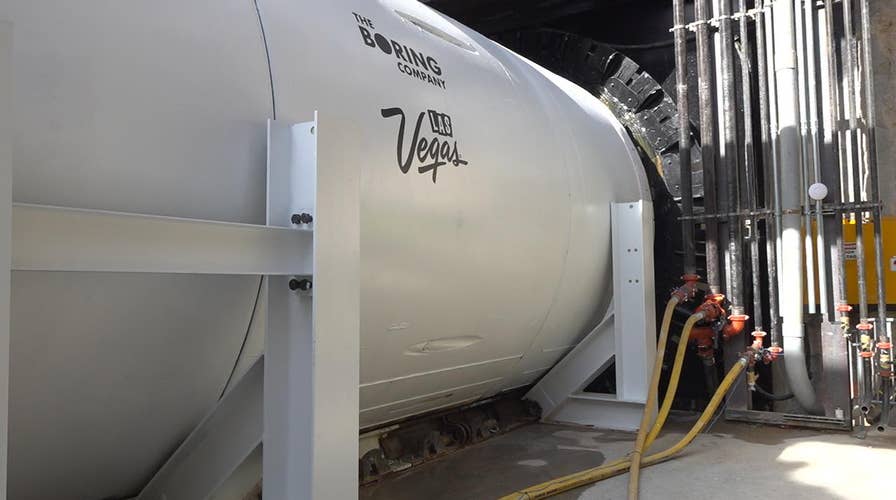Elon Musk's Boring Company begins tunneling in Las Vegas
Elon Musk’s The Boring Company finally has something to point to as tangible proof its tunneling technology can help transform transportation as it broke ground last week on its first-ever commercial project in Las Vegas.
Elon Musk’s The Boring Company finally has something to point to as tangible proof its tunneling technology can help transform transportation as it broke ground last week on its first-ever commercial project in Las Vegas.
The Las Vegas Convention Center and Visitors Authority (LVCVA) contracted the Boring Co., led by president Steve Davis, to construct an underground people mover to transport the roughly 1.3 million annual visitors throughout the sprawling 200-acre facility.
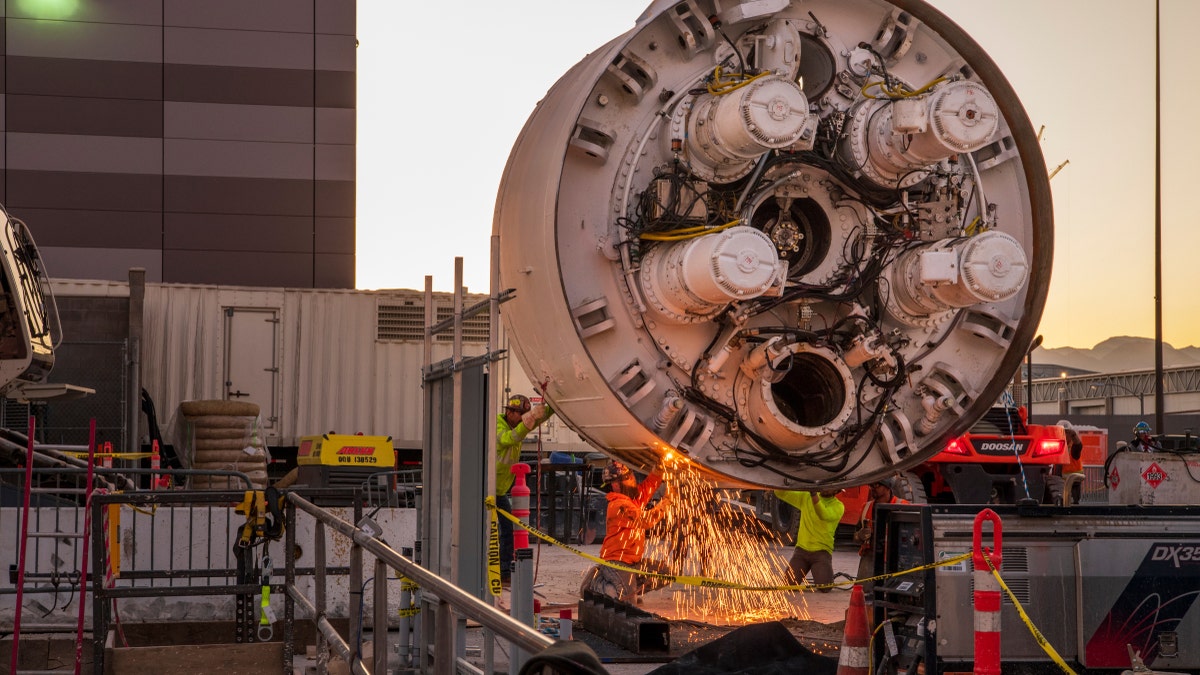
Workers cut the storage rack from the base of the drill head as the Boring Company prepares to lower the drill head for the People Mover tunnel which will connect convention halls as part of the LVCCD Phase 2 construction in the Red Lot east of the South Hall at the Las Vegas Convention center on Monday, Oct. 28, 2019. (Mark Damon/Las Vegas News Bureau)
“It's about a mile and a quarter from one end of our campus to the other as the crow flies. And you can't walk this campus as the crow flies,” Las Vegas Convention Center and Visitors Authority President Steve Hill told reporters at the groundbreaking ceremony Friday. “We really felt that the Boring Company offered a solution to people movement on the campus that was substantially more affordable, substantially more convenient, more fun, frankly, and offered an opportunity for the destination to take a look at this technology that could potentially work to solve transportation problems throughout our community.”
COULD ELON MUSK’S HIGH-SPEED TUNNEL IN LAS VEGAS ANSWER NATION’S INFRASTRUCTURE PROBLEM?
The project, which costs $52.5 million, will consist of three stations connecting the 3.2 million square feet Convention Center with the 1.4 million-square-foot West Hall expansion. Guests will ride in fully autonomous Tesla vehicles that reach top speeds of about 35 mph and will first be manned during the system's debut.
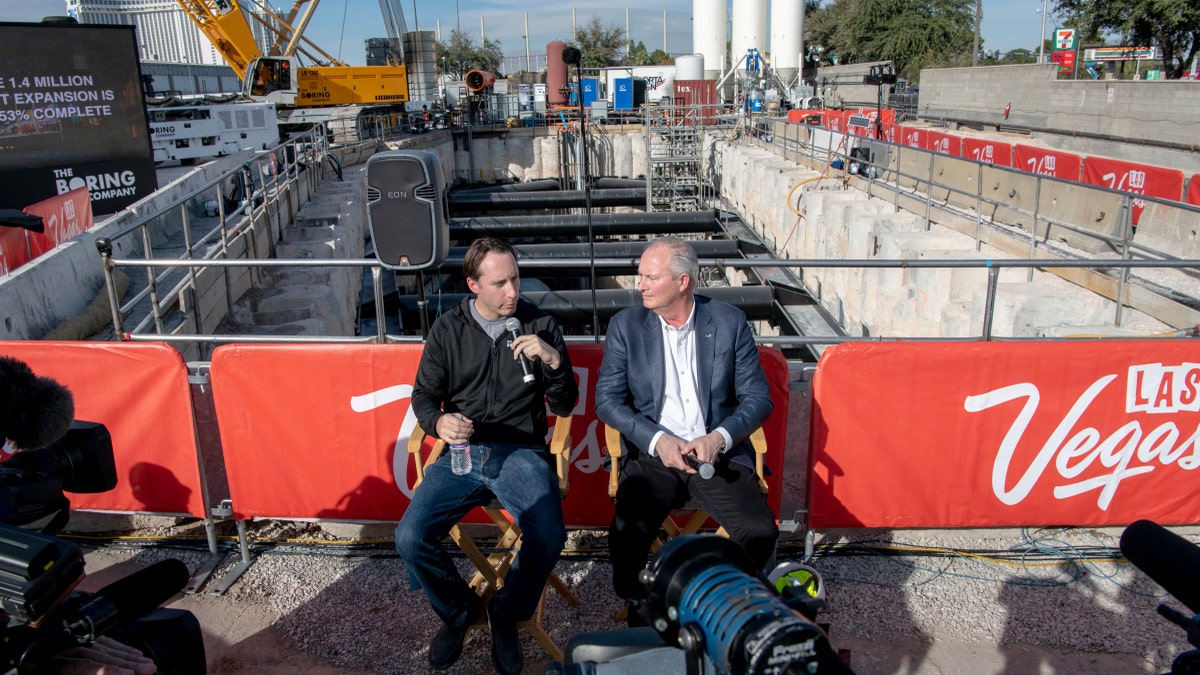
The Boring Company President Steve Davis, left, and LVCVA CEO Steve Hill respond at a Q&A session as The Boring Company and Las Vegas Convention and Visitors Authority prepare for the start of tunneling for The Boring Company’s people mover at the Las Vegas Convention Center on Friday, Nov. 15, 2019. (Mark Damon/Las Vegas News Bureau)
“When we talk to our customers that are going to be here in the building, all the shows that are here, they're excited not only because it provides a great solution to allow their shows to be seen more easily and more conveniently and with better coverage but they know it's going to be an attraction,” Hill said, adding that it’s “one more reason for people to come to a show at the Las Vegas Convention Center.”
The project will also serve as a testing ground for the technology and its viability as a solution to help solve the ever-growing transportation issues as space above ground becomes more and more limited.
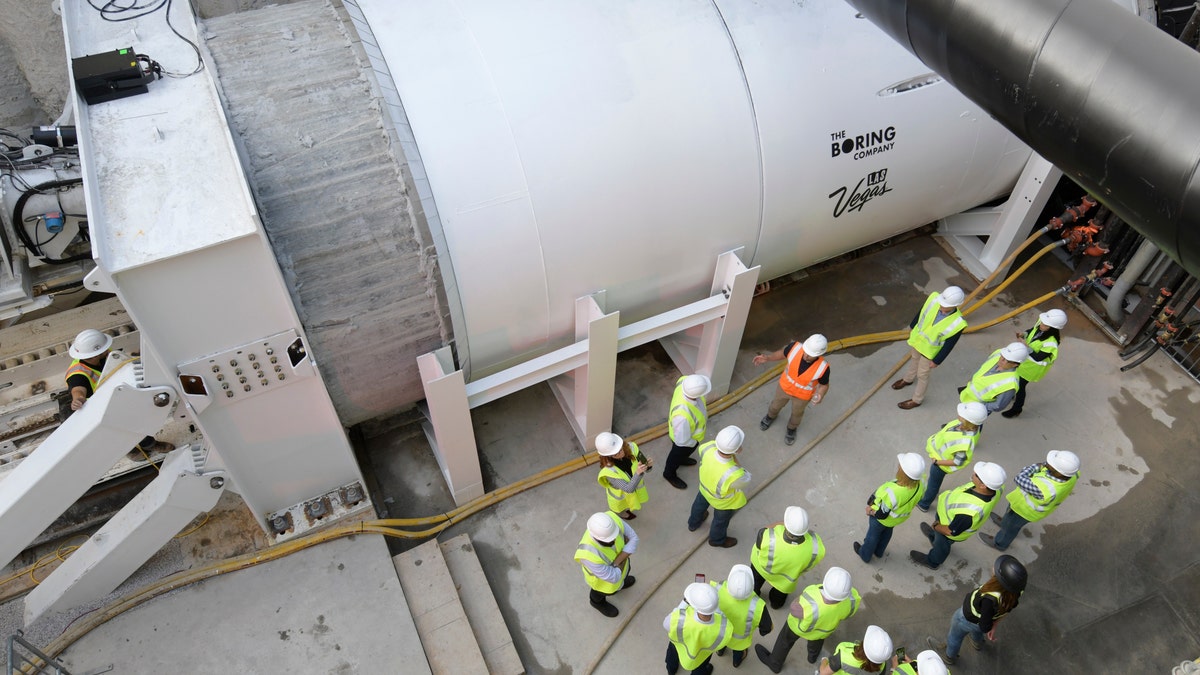
Guests get a tour of the Boring Machine before the Boring Company begins tunneling for the Las Vegas Convention Center people mover that will eventually connect the South Hall to the new West Hall expansion Friday, November 15, 2019. (Sam Morris/Las Vegas News Bureau)
Although Davis said he is “laser-focused” on the current project at the Las Vegas Convention Center, he hopes to use it as a platform to expand further into the city.
“Obviously, we are thinking about the future – but as Steve and I have talked a future could really be an expansion within Las Vegas itself,” Davis said at a press conference at the groundbreaking ceremony on Friday. “So, first we focus on this project and if everyone is happy we really see if the community is interested in us expanding here.”
ELON MUSK SAYS AI WILL SOON MAKE US LOOK LIKE MONKEYS
A sentiment echoed by Hill, who said the “framework for a deal in place with the Boring Company to expand into not only the strip and the airport but out in the destination” is already in place.
“This technology and particularly the business model that it operates under makes it exceptionally affordable makes it exceptionally quick so we feel like just over the next couple of years we can be moving into the destination and start with a solution for transportation issues across the city,” Hill said.
While the Boring Co. has several other proposals/projects in the works in cities like Los Angeles, Chicago as well as Washington D.C. and Maryland, it has yet to build more than a two-mile test tunnel in Hawthorne, Calif.
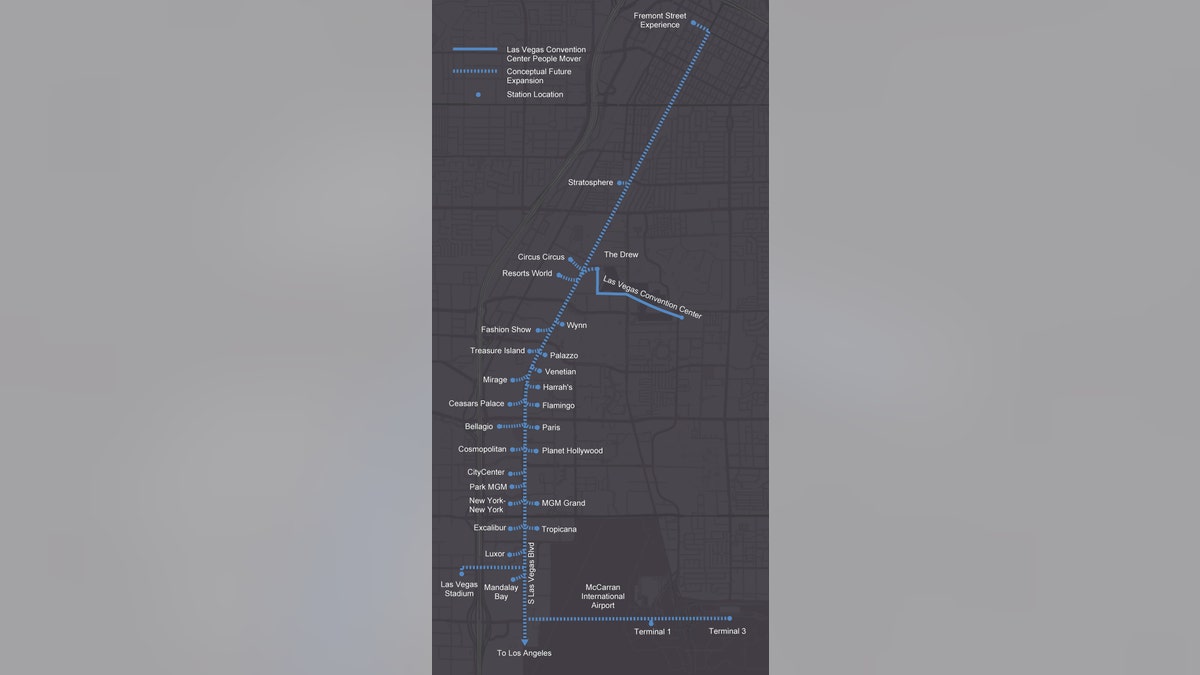
Possible expansion routes at the Las Vegas Convention Center and Visitors Authority. (LVCVA)
Russell Holly, managing editor of Mobile Nations, told Fox News back in March when the LVCVA voted to move forward with negotiations with Musk’s Boring Co., that the Tesla founder has a “huge track record of overpromising,” but said if the Boring Company is able to follow through in Las Vegas, it could be “a huge deal for the company and lead to a lot of other contracts.”
What sets the Boring Co. apart from other companies is not the tunnel itself, but the extremely low cost at which it claims to be able to build it – in this case, just over $50 million.
RURAL AMERICA STILL STRUGGLING FOR ACCESS TO HIGH-SPEED INTERNET SERVICE
“The whole purpose of our company is not to say we invented tunneling, that would be ludicrous – it is to say that we can do it faster, and we can do it much less expensive and we’re willing to put our money where our mouth is by doing all firm-based price and performance-based contracts,” Steve Davis, Boring Co. president, said at an LVCVA committee meeting back in March.
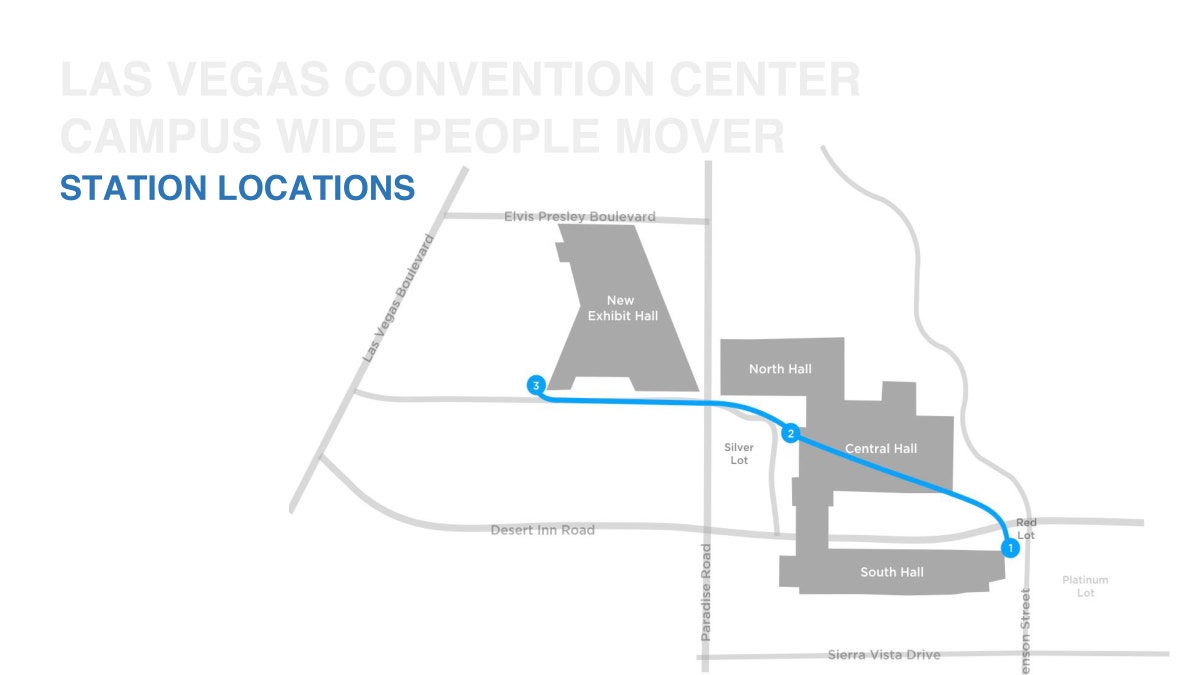
Las Vegas Convention Center Campus Wide People Mover station locations, updated Sept. 11, 2019. (Cordell Corporation via Las Vegas News Bureau)
For perspective, the San Francisco Central Subway cost $920 million per mile while the Seattle U-Link came in at $600 million per mile on the cheaper end, according to data compiled by writer and transportation researcher Alon Levy for CityLab last January.
The 2015 subway extension in New York City for Manhattan’s East Side cost $2.5 billion per mile, while the addition to the No. 7 line cost $1.5 billion, the New York Times pointed out.
CLICK HERE TO GET THE FOX NEWS APP
“I think an important part of what we're doing here is that it is really looking at the vertical integration of the company at the end of the day. The product is not a tunnel, the product is a transportation system. And so that starts from project planning for the boring machine itself to the actual pits that we're building, to the actual operations, the actual vehicles,” Davis said. “If you put that all in one place and I know that kind of sounds obvious and straightforward, I would challenge you to find that elsewhere.”
If all goes according to plan, the project at the Convention Center is scheduled to be completed in January 2021 and could be replicated in other cities to help solve the nation’s infrastructure problem.
“We are certainly not without need, and we need some innovative solutions that will hopefully bring down some of the costs -- which to me, was one of the intriguing things about what Musk has proposed is that if the boring technology works as he's predicting, it will it could really bring down the cost of doing some of this underground,” Michele Nellenbach, director of strategic initiatives at the Bipartisan Policy Center, told Fox News in March.
